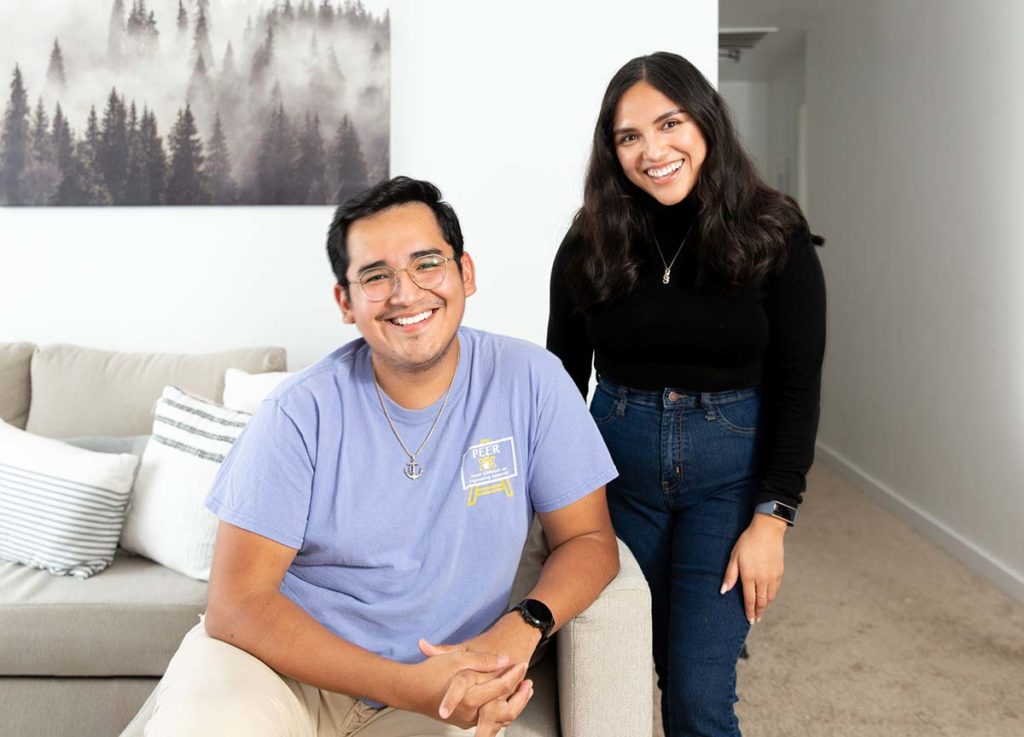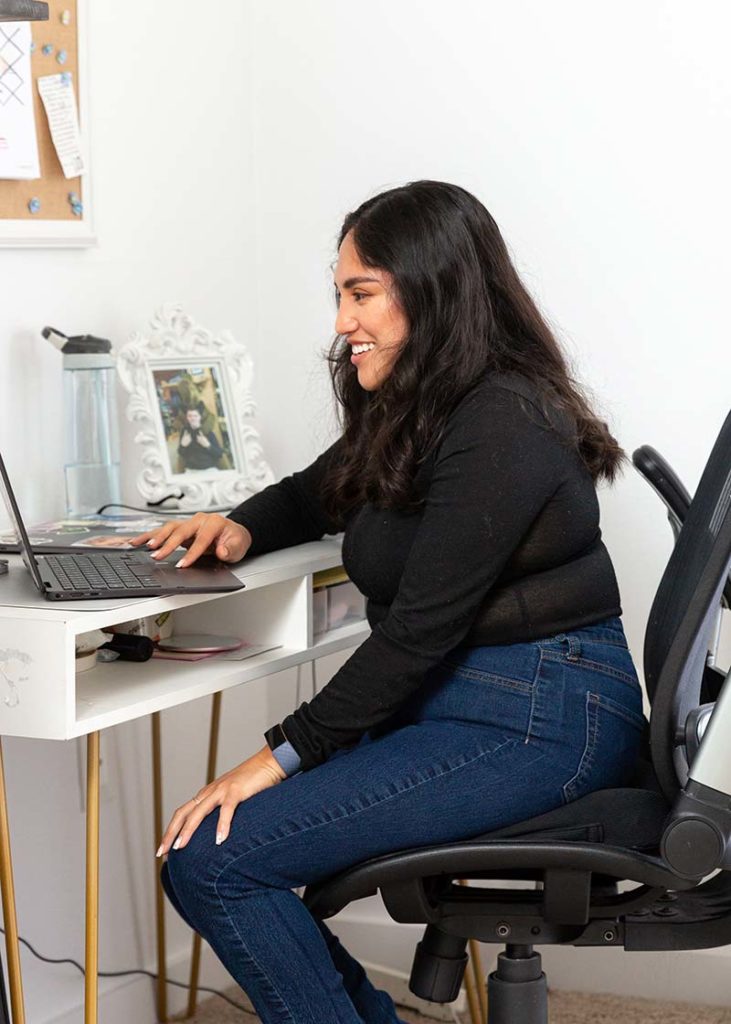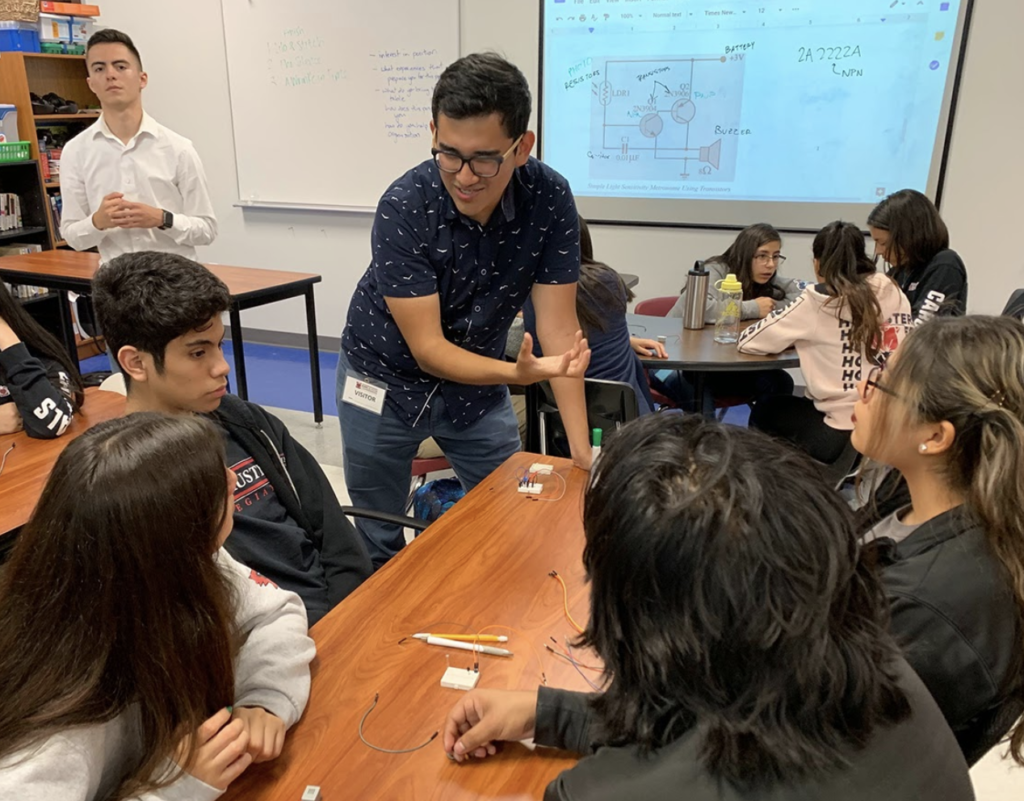
Rodolfo and Gemma are as close as siblings can be, in large part because of the immense hurdles they have overcome together. They welcomed me into Gemma’s apartment, where they balance full-time school, full-time jobs, and occasional relaxing in between.
Meeting them both in such a cozy, beautiful apartment, with their smiles and confident demeanor, you wouldn’t be able to discern how challenging things have been for them. Beneath all the signals that they’ve “made it” in the Austin, Texas economy – which is booming with growth – they have regularly faced being left behind.
Rodolfo and Gemma migrated to Austin as children under the care of their mother. Gemma talks about her mother with such reverence: “She was a single mom for most of our childhood, and because she was an immigrant here, I can’t imagine how alone and isolated she must have felt. She would always say to Rodolfo and me, ‘We only have each other. Nobody else in the world is going to care and look out for you the way you’ll look out for each other.’ We were so close, and as the older sister, I always wanted to do better for Rodolfo, I wanted to inspire him.”
Rodolfo explains how helpful family was in forming resilience when the educational experience was limited. “My mom eventually found a partner who helped raise us, but neither of them finished primary school in Mexico. Of course, they always inspired us to have grit and work hard.” He laughs and imitates his parents’ exhortations in Spanish that echoed throughout their childhood. “They’d always say ‘¡Ponte las pilas!’ which literally means ‘put in your batteries!’ Or they’d say ‘¡Échale ganas!’ which basically means ‘go for it!’”
“We were so close, and as the older sister, I always wanted to do better for Rodolfo, I wanted to inspire him.”
Rodolfo and Gemma are grateful for their parent’s decision to enroll them in KIPP Austin, a charter school for underserved communities. “But when we finished at KIPP, our parents felt their job was done. They couldn’t lead us further. KIPP was great to inspire us to get to college, but there are only so many resources and time you can allocate to an individual. That’s when we fell into some pretty big pitfalls in pursuing our degrees.”
Gemma enrolled at St. Edward’s University, a competitive local college in Austin, with a combination of scholarships, loans, and money from the family. “My mom didn’t even know what she was reading, but she signed it. My freshman year, I had thought I had made it, I was smooth sailing. Eventually, it became much more challenging. Even though KIPP taught about higher education, it’s hard to prepare minorities for a traditional, four-year school, and I couldn’t shake the experience of being an outsider. By the third semester, I had to drop out.”

“That’s right about the time that Rodolfo was graduating from KIPP, and he was so excited about his acceptance into an engineering program at Syracuse. He had prepared so well, and his heart was so set on it. I’ll never forget the heartbreaking conversation in the car that day when I told him that our family was out of money and couldn’t pay for his college. And of course, I felt guilty because I was the one who got to go to St. Edward’s, even though I didn’t finish. I wished so bad I could have given him the money that was spent on me.”
Rodolfo never blamed Gemma, and patiently tells his version of the story. “I didn’t qualify for financial aid or scholarships like many of my classmates, since I was born in Mexico. So I learned a very hard lesson that day, losing my college dream: no matter how determined I am, there are things that I can’t make happen for myself, and I just don’t have the same opportunities as others. It was truly heartbreaking, to feel like the dream that I had was crushed.”
After graduating from KIPP, Rodolfo enrolled at Austin Community Colleges (ACC), and his challenges only grew. “I was struggling to feel at home as a commuter student attending ACC, knowing I was missing out on an education that I thought I had earned through an entire childhood of hard work. It was like an unfulfilled promise by the education system. I resented it all. I was commuting to campus from my family home, but then they were longer able to afford our home in East Austin because of gentrification and rising rents. They had to move in with extended family outside of town, and I had to get an apartment by myself to stay close to campus. I was already working full time as a valet, but now I had to split my paycheck between rent and school.”
From there, Rodolfo’s difficulties continued: “On top of that, in 2017 the Trump Administration canceled the DACA immigration program, my work visa expired before a judge reinstated the program, and I lost my job. I became extremely anxious about my future and my family’s future life in America. Studying computer science was becoming impossible. I was failing my classes.”
“I was evicted from my apartment because I couldn’t work and I couldn’t afford rent. Even today I’m still paying off the debt from that unemployment. At that low point, I felt like a failure, and the self-esteem that I had gained all those years, the healthy ego that I had developed, was crushed. I was embarrassed about my past and my future.”
At this desperate moment, Rodolfo was encouraged by his high school teachers at KIPP to reach out to PelotonU.
This is when Rodolfo’s entire demeanor changes and he grins ear to ear. “I still remember the very first time I spoke on the phone with a lady named Avianne at PelotonU. I was still figuring out if it would be a good decision for me. I remember immediately loving my interaction with her and loving PelotonU. It was a spark of hope.”
Rodolfo joined PelotonU and was paired with a coach named Erika to help him succeed. Retelling this to me, Rodolfo leans back in his chair with a look of euphoric gratitude and grasps for words. “Erika has been…. one of the most amazing people. She’s the one that I spoke to weekly, and I felt like we could talk about anything, not just my academics. Unlike a professor or university staff member, I could just level with her about my struggles. She treated me as an equal. I never got that in the college system.”
I still remember the very first time I spoke on the phone with a lady named Avianne at PelotonU. I remember immediately loving my interaction with her and loving PelotonU. It was a spark of hope.
PelotonU not only helped Rodolfo finish his associate degree, but it also helped him get a certification from a coding academy. “The staff opened up their own professional network in Austin to me. They helped me find the academy, and they even helped me get financial help! PelotonU gave me so much more than just a college degree, but a career support system from a team that felt like a family.”
Now, in our interview, Rodolfo is his most confident self, and his passion just pours out as he shares: “I want this nonprofit that I started with the help of PelotonU to inspire other DACA recipients and immigrants like me to pursue careers in STEM, even when we feel like outsiders. You need a level of ego to make it in this world. I have so many friends who are immigrants and don’t have that healthy ego. They don’t want to pursue a college education or a career. They feel so excluded and unworthy. They’re afraid for their future with an unstable immigration system. They don’t have any support. I preach to them and other students to have that confidence and resilience. You need it to succeed.”

While Rodolfo was thriving at PelotonU, Gemma was working hard balancing internships and classes at ACC. “After I had to drop out of Saint Edward’s, Rodolfo had the grit to continue at ACC, which inspired me to start internships. A lot of the internships were with nonprofits to help underprivileged youth. It was the people in those nonprofits that helped me to get where I am.”
Gemma was determined and eventually landed an internship at Accenture. Finishing school at ACC became increasingly inconvenient as her work experience grew. Nonetheless, Rodolfo had encouraged Gemma long enough that she finally decided to apply to PelotonU.
“My brother had been telling me about PelotonU and I was skeptical, thinking ‘there’s no way it can be that good’. I had just come from a 4-year university where they drilled into me that traditional college is the only path. But, in the middle of my semester at ACC, PelotonU offered a scholarship for DACA recipients like me. When I found out about the scholarship, it was already the last day to apply. I was on a trip at the time, riding in the back seat, and applying on my phone. We only had cell service in spotty areas, but I was able to submit – it was so dramatic! It wasn’t until I got back that I found out for sure that my application even went through!”
Gemma quickly found value in the pace of the PelotonU degree and the practicality of the curriculum: a series of projects with real-world applications, completed one at a time, rather than several courses at once, which is extremely challenging to balance with a full-time career.
“While I worked at Accenture, I found the lessons and projects in my curriculum to be incredibly helpful to my everyday work in an office setting. It was like the lessons at PelotonU followed my career at Accenture, and I think that applying my lessons learned solidified my career there as a standout employee.”
Together, Rodolfo and Gemma look back with a mix of gratitude and frustration. “We recognize that so many people along the way generously helped us out if we fell into an unexpected hole. We are so privileged to have these friends and mentors because we’re not the only ones trying this hard, and we’re lucky to be where we are. Plenty of students that are smarter than us may have a heavier accent, or different skin color, or a certain geography that keeps them from receiving the same help we received, which they deserve.“
“At the same time, looking back, we wish we were informed of the pitfalls that we had to find our way out of, like the challenges of a four-year university, the burden of student debt, and how narrow the pathway to a career can be without a network of influential people. Now that we know these challenges, especially as immigrants, we are so passionate to help our peers learn from our challenges. It’s a shame that more students don’t know about PelotonU, because it really can transform the lives of hardworking, determined students. We know that we have a story to tell, but we need the help of others to spread it to those that need to hear it most.”